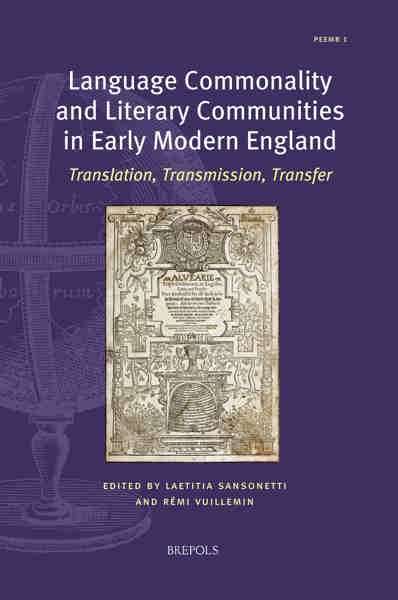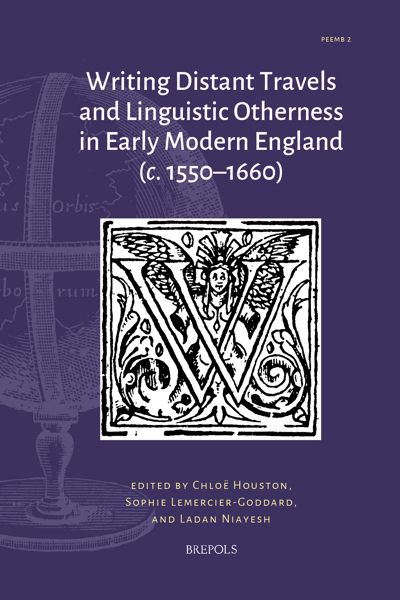
Writing Distant Travels and Linguistic Otherness in Early Modern England (c. 1550–1660)
Chloë Houston, Sophie Lemercier-Goddard, Ladan Niayesh (eds)
- Pages: 280 p.
- Size:156 x 234 mm
- Illustrations:4 b/w
- Language(s):English
- Publication Year:2025
- € 90,00 EXCL. VAT RETAIL PRICE
- ISBN: 978-2-503-59963-2
- Hardback
- Available
- € 90,00 EXCL. VAT RETAIL PRICE
- ISBN: 978-2-503-60391-9
- E-book
- Available
This volume explores the complexities and nuances of linguistic engagements with distant otherness in English texts from the mid-sixteenth century onward, when Britain was increasingly positioning itself as an Atlantic and global actor, causing translation and multilingualism to flourish in travel compendia, reports, diaries, humanist writing, and drama.
Chloë Houston is Associate Professor of Early Modern Drama in the Department of English Literature at the University of Reading.
Sophie Lemercier-Goddard is Associate Professor of English at Ecole Normale Supérieure de Lyon.
Ladan Niayesh is Professor of early modern English studies at Université Paris Cité.
As Britain’s global interests expanded from the mid-sixteenth century, geographic mobility encouraged many forms of multilingual practices in English writings. Translations, lexical borrowings, and records of exchanges between travellers and far-off lands and peoples diversely registered, communicated, engaged and politicised encounters with alterity. Meanwhile, earlier continental European translations also influenced and complicated the reception of distant otherness, entailing questions of linguistic hybridity or pluralism.
This volume explores some of the practices and strategies underpinning polyglot encounters in travel accounts produced, translated, or read in England, as well as in artistic and educational materials inflected by those travels. Drawing on linguistic, lexicographic, literary, and historical methodologies, the twelve chapters in this volume collectively look into the contexts and significances of textual contact zones. Particular attention is paid to uses of multilingualism in processes of identity construction, defining and promoting national or imperial agendas, appropriating and assimilating foreign linguistic capital, or meeting resistance and limits from linguistic and cultural otherness refusing to lend itself to a subjected or go-between status. Treating of indigenous languages, newly anglicized words, and new artistic and instructional materials, the volume makes the case for the vibrancy and influence of early modern English engagements with polyglossia and the need for multiple scales of approach to – and interdisciplinary perspectives on – the subject.
Introduction: A World of Words
Ladan Niayesh, with Chloë Houston and Sophie Lemercier-Goddard
Part I. Intralinguistic Communication in the Contact Zone
1. ‘Ylyaovte!’ English Engagements with the ‘Strange’ Tongues of the Far North
Matthew Dimmock
2. Speaking in Tongues in Virginia: Strategies of Translation in Algonquian-English First Encounters
Sophie Lemercier-Goddard
3. The Madoc Legend: Language and Race at the Dawn of the First British Empire
Andrew Hadfield
Part II. Producing Knowledge: Travel Writing and Translation
4. Translating Iberian Polyglossia in Richard Eden’s The Arte of navigation
Anna Demoux
5. ‘To all gentlemen, merchants and pilots’: Style and Ideology in John Florio’s Two Navigations
Donatella Montini
6. Englishing Strangers in Richard Hakluyt’s Principal Navigations
Emily Stevenson
7. The Arabic and Ottoman Turkish Languages in Early Modern English Travel Accounts of the Ottoman Empire
Anders Ingram
Part III. The Stuff of Words: Material and Literary Traces
8. Linguistic Reclaimings of Persia in Early Modern Travelogues and Travel Fiction
Ladan Niayesh
9. Translating Mexican Cochineal in Shakespeare’s Drama
Armelle Sabatier
10. Acts of Translation: The Persian Language on Stage and Page in The Travels of the Three English Brothers (1607) and Mirza (1655)
Chloë Houston
11. ‘Why speak you this broken French when y’are a whole Englishman?’: French, Travelling, Self-Satire, and Cultural Mediation in London City Comedy
Asseline Sel
12. ‘Their Garments variegate like ye fishes in ye Euxine sea’: Fashion, Languages, and Perceptions of the Ottoman World at the Early Modern English Universities
Sarah Knight
Index

